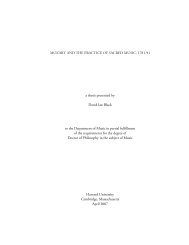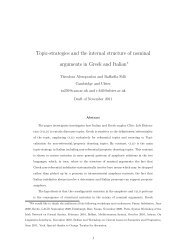Subjects, Topics and the Interpretation of Referential pro.
Subjects, Topics and the Interpretation of Referential pro.
Subjects, Topics and the Interpretation of Referential pro.
You also want an ePaper? Increase the reach of your titles
YUMPU automatically turns print PDFs into web optimized ePapers that Google loves.
Figure 11<br />
Also in this case, recoverability or ‘long distance’ cannot be invoked: <strong>the</strong> crucial point is that<br />
<strong>the</strong> PP al capo (in <strong>the</strong> previous sentence) is not a Topic, hence it cannot match its referential<br />
features with a subsequent <strong>pro</strong>. The rising <strong>pro</strong>noun lui is <strong>the</strong>refore needed to obviate<br />
coreference with un tizio di Formia (<strong>the</strong> current Topic at that point).<br />
In Cardinaletti’s (2004) analysis, <strong>the</strong> necessity <strong>of</strong> a strong <strong>pro</strong>noun in (15) would be<br />
attributed to <strong>the</strong> fact that il capo, though familiar, is not a subject, but an object. Though ccomm<strong>and</strong><br />
is undoubtedly a key requirement to obtain a Topic-antecedent relation, data show<br />
that this condition is not subject-driven. Consider <strong>the</strong> following passage:<br />
(16) conduco insieme [al capo]j [questa rubrica]m del giovedì sera […] <strong>pro</strong>m è scritta/ cioè<br />
anche perché noi praticamente (Figure 12) introduciamo una serie di servizi/ di interviste<br />
fatte fuori […] ma speriamo che un po’ alla volta che luij mi dia <strong>pro</strong>prio tutto il<br />
Caleidoscopio (Figure 13)<br />
‘I conduct with [my boss]j [this <strong>pro</strong>gram]m on Thursday night […] <strong>pro</strong>m is written/ I<br />
mean, also because we in fact present a number <strong>of</strong> external interviews […] but let’s hope<br />
that little by little that hej will give me all <strong>the</strong> ‘Caleidoscopio’ [= <strong>the</strong> relevant <strong>pro</strong>gram]’<br />
As we can see, <strong>the</strong> first NS (<strong>pro</strong>m) is coreferent with questa rubrica, which is not <strong>the</strong> subject,<br />
but a marginalized DO (cf. Cardinaletti 2002). 26 Since <strong>the</strong> interpretation <strong>of</strong> <strong>the</strong> relevant <strong>pro</strong> is<br />
not at stake, this example shows that <strong>pro</strong>-coreference is not subject-driven, but Topic-driven.<br />
The fact that questa rubrica is <strong>the</strong> current Aboutness Topic at <strong>the</strong> beginning <strong>of</strong> text (16) is<br />
<strong>pro</strong>ved by <strong>the</strong> realization <strong>of</strong> noi in <strong>the</strong> following sentence: <strong>the</strong> speaker wants to shift <strong>the</strong><br />
conversation to herself <strong>and</strong> her boss, hence, a rising tone is needed to establish <strong>the</strong> ‘new’<br />
Aboutness Topic (cf. Figure 12). When she finally restricts <strong>the</strong> topic only to her boss, a L*+H<br />
lui is <strong>pro</strong>duced again, as expected (cf. Figure 13):<br />
Figure 12<br />
26 Syntactic marginalization is shown by <strong>the</strong> fact that <strong>the</strong> DO (questa rubrica) follows <strong>the</strong> IO (al capo) <strong>and</strong> its<br />
status as ‘given’ information is made clear by <strong>the</strong> anaphoric use <strong>of</strong> <strong>the</strong> demonstrative questa (‘this’). The<br />
discourse role <strong>of</strong> non-clitic resumed right-h<strong>and</strong> <strong>Topics</strong> in Italian is discussed in Frascarelli (2000, 2004a).<br />
15
















